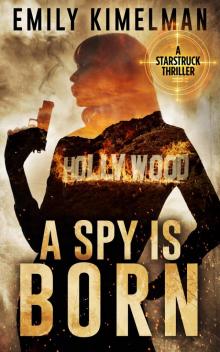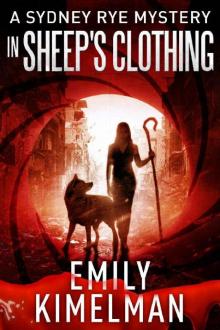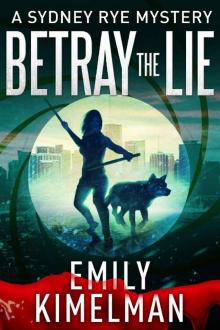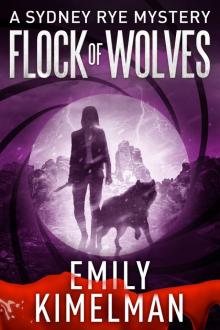- Home
- Emily Kimelman
In Sheep's Clothing Page 3
In Sheep's Clothing Read online
Page 3
Please Jesus, keep me safe.
She picked up the briefcase and pushed out of the bathroom, her purse over her shoulder. A bar directly to her left sucked all of her attention and froze her feet. A woman holding a martini glass laughed, leaning forward, showing off her cleavage.
No.
April needed to get to Joy. She had to find her daughter.
She forced one sneaker-clad foot in front of the other. A drunk stumbled, knocking into her.
April lurched away and, gripping the briefcase tighter, began to run—her body surging with adrenaline, with purpose; she had to get out of there. April ran through the casino, dodging people, desperate for fresh air, desperate to be free from the smoke and the booze and the greed.
She burst out the front doors, where uniformed bell boys waited to offer her a taxi, to offer her anything in the world that she desired.
She had to go.
The flickering fires of Hell burned hot and painful on the soles of her feet. The scent of her own seared flesh stung her eyes, stifling her so that she could barely breathe.
April stumbled into the proffered taxi, gripping her purse and briefcase. The driver, a frog-like woman with bulging eyes, asked, "Where to?"
April wasn't sure. Where was she going? What was her plan?
Leave it to Jesus. "Airport, please."
They maneuvered down the strip through thick traffic. April closed her eyes, concentrating on her breath, the rise and fall of her chest as she struggled to shut out the voice in her head screaming for a vodka and cranberry. Just one…the devil always tried to negotiate.
As they approached an underpass, April opened her eyes. Dark forms hunkered along the roadway…homeless people. The cab slowed to a stop under the bridge.
April opened her purse: purple crocodile, expensive, and filled with credit cards and her identifications. She slipped her passport, that small blue notebook which gave her the rights of a US citizen, into her pocket and then pushed the purse out the window.
The light turned green, and the taxi progressed, turning left, pulling onto the freeway. Wind rushed into the cab through the open window.
Jesus, please protect me. Help me with my quest. Help me find my daughter.
Chapter Five
Nadia
A breeze, carrying the scent of sweet roses, rustled the sheets strung out to dry between the exposed rebar. Nadia lay on her stomach, a pencil gripped between her teeth as she stared down at the English book. She'd escaped to the roof of her family's single-story home to avoid the stifling heat inside the house.
"Nadia!" Her head jerked up at the harshness of her father's tone. Absorbed in her schoolwork, she must have missed his calling her.
"Yes, Father, I'm up here."
She scrambled to the edge of the roof, poking her head out between the hanging laundry and down into the garden where her father stood, holding an AK-47. He smiled when he saw her.
"Time to practice." He held up the gun.
Nadia's throat went dry, and she didn't move. Her father frowned. "It's as important as your schoolwork." Nadia knew he was right. But she preferred working toward her goal of becoming an English teacher to facing the harsh reality of her family's situation.
"Yes, Father." Knowing how to shoot was more important than ever, and yet Nadia feared her practice sessions for the first time. She gathered up her books and climbed down the stairs, passing through the kitchen where her mother washed apricots from the tree outside. "I'll need your help to make jam in a bit."
"Yes, Mother."
As the only daughter, Nadia helped her mother with the housework. And, because she was Yazidi, a minority religious group in a region ravaged by sectarian violence, Nadia also learned to shoot. Her father began the lessons when she was fifteen, and now three years later, Nadia's skills made her an asset to the family.
They could protect their land, family, and faith.
When Nadia stepped outside into the bright day, the smells of their garden wafted toward her. The sweetness of the apricot trees mingled with the tang of mint and brought a small smile to Nadia's face.
It smelled like home.
She approached her father slowly, and he smiled at her. "You're a very pretty girl." He told her. "Soon, you will make someone a very happy and good wife."
Nadia's cheeks warmed and a smile spread across her face at the compliment. While she longed to be a teacher, Nadia also hoped to get married and have children of her own. Her father's face turned serious as he handed over the gun.
Nadia took it with a nod, straightening out her own expression.
She put her left foot forward, evenly distributing her weight before placing the stock at her shoulder, and aiming down the barrel. Nadia flicked off the safety with a practiced move.
The Kalashnikov rifle was new, one of the many expenses that had taken precedence over building a second story on their home.
When Nadia's father first started teaching her to shoot, Nadia assumed the three AK-47s they kept locked in the hall were to deter thieves, something to help them keep hold of what they had—their valuables.
Now she knew that being a minority with differing beliefs was dangerous. They kept the guns close, and her father taught her to shoot, because like their ancestors, they must prepare for their neighbors to turn on them.
Nadia's grandfather, a gray and hunched figure with bony yet strong hands, explained it to her. "The Yazidi are always being persecuted. For our entire lives, our entire history, the Muslims have tried to wipe us out." He smiled, a flash of crooked teeth in the wrinkled landscape of his face. "But we always survive. And that is why in our morning prayers we say: May our religion go on."
Amen. Amen. Amen.
Nadia aimed at the mulberry tree, where a target hung. She fired, hitting the bullseye.
Her father whistled. "I think you're almost the best shot in the family. Certainly better than your mother at this point."
Pride infused Nadia's young body.
The first time she'd fired the Kalashnikov, the loud report and hard kick of the gun had startled her, and the shot went wide. Now the big bang hardly bothered her, and the recoil was as familiar as a shoulder punch from her older brother.
Nadia practiced a few more rounds, her father correcting her footing, pulling back her shoulders, helping her to become even better. The acrid scent of gun smoke mingled with the sweeter flavors of the yard. The mix gave Nadia a sense of security.
This was her home. And she could defend it.
A shout from her older brother, Khalid, jerked both her and her father's heads toward the house.
"Come quick!" he yelled, his figure appearing in the doorway.
Khalid was twenty-one, thin and tall, with dark eyes and a flop of black hair that seemed to always be overgrown no matter how often their mother trimmed it. "It's on the news. Mosul is under attack."
A chill ran over Nadia's body, numbing her lips.
Her father's big hand landed on her shoulder. She looked up at him. The skin around his eyes was tight, but he nodded at her. "That is many miles from here. And the Peshmerga will protect us."
He couldn't know that for sure. Was father lying?
His hand shook her shoulder and she blinked, darkness clouding her vision. "Wake up," he said, his arm shaking her hard.
"Nadia," a voice hissed in her ear.
Her body ached, the pride of her father's compliments had become twisted into a deep, painful shame. Nadia was ruined. She blinked again, coming out of the familiar dream fully, remembering where she was and the things that had happened to her.
Nadia's father had lied.
Her friend, Farridah, hovered above her, the girl's oval face pale in the gray darkness of dawn. "Come on," the girl encouraged. "We need to pray, the sun is just rising."
Nadia nodded and turned away to hide the tears springing to her eyes. After dreaming of her family, then waking up here, in this container, with these other women—other pieces of property�
��hurt. But Nadia tightened her jaw, chasing away the tears that threatened to spill. Her grandfather's assurance that their religion lived on, no matter what, rang in her mind as she stepped up to the small, dirty window with the other prisoners.
As the sun peeked over the horizon, lighting the oil compound where their owners were stationed, the women held their hands out toward those nourishing rays and prayed.
Amen. Amen. Amen.
Chapter Six
Shaheer
Shaheer's mother stood at the sink, her hands, dripping with sudsy water, resting on the edge. Her exposed face, an oval of olive skin surrounded by the black of her headscarf, reminded him of the moon glowing in the dark of night.
Shaheer stared at her profile; the thin, strong nose, the full lips, the chin, were so like his own.
She took a deep breath and looked over at him, smiling. "You must be leaving soon?"
Shaheer had turned twelve three days prior, and his father had assigned him his own herd of goats.
His sister's laugh came from the next room, and she bounded into the kitchen, grinning. Two years older than him, Rashaa would stay at home with their mother.
Girls stayed home.
While he got to go out into the world. As was appropriate, since he was a man, and she was a woman. Allah designed men and women differently.
His mother smiled as Rashaa began to dry the dishes on the sideboard.
"Can I go meet Insaaf? We want to pick berries."
His mother nodded. "Yes, that sounds nice."
"Don't you have chores to do?" He'd like to be out with his friends, but Shaheer had reached manhood; he had responsibilities. Only women and children picked berries. Men were too important.
"It is a chore." Rashaa smiled at him, reaching out to muss his hair. Shaheer dodged her, his face heating. "I'll make jam with them."
His mother nodded, and squeezed his sister's shoulder affectionately. "I'm sure it will be delicious. Who will escort you?" Since Daesh now governed their village, young women had to be accompanied by men to go anywhere. As was right.
"Insaaf and her brother will meet me at the end of the street."
His sister left soon after, the door shutting behind her. Shaheer stood and went to the window, watching her pass through the garden and open the back gate. She stepped out onto the narrow alley without raising her niqab!
He rushed out, chasing her down the dirt street.
His mother called after him, but he ignored her.
"Rashaa!" He yelled, his voice cracking, rage and humiliation joining forces to speed his steps. If anyone saw her, it could mean death and eternal damnation.
His sister turned, cocking her head. He extended his arm, pointing his finger at her. "You will shame our family. Cover your face!"
His sister's eyes widened. "I'm sorry. I forgot." She quickly latched the veil, her brown eyes, so like his own yet so different, watching him over the black cloth of her niqab.
He stormed up to her, his fist balled, adrenaline coursing through his veins. If anyone had seen... "I will tell father of this."
His sister's eyes brimmed with tears.
"Please don't." Her voice was a whisper, the words so small they didn't even stir the cloth covering her lips.
"You must learn to behave. Things are not the same now."
He was a man. Daesh controlled their village.
"Yes, brother."
Insaaf and her brother appeared at the end of the alley and waved at him. He nodded back but returned to the house without speaking with them. He did not trust himself to remain calm. Did not want them to see his weakness.
He loved his sister, even if she put them all in danger.
His mother stood in the doorway, her niqab raised, eyes burning bright.
"You did not need to speak to her so harshly."
"What?" Tears suddenly stung his eyes. "I protected her, protected our family. Can you imagine if she had stepped onto the main street with her face exposed? What that could mean for our family. For father?"
"There are different ways of handling things, Shaheer; you don't need to be a brute."
"I saved us all!"
Why was his mother being like this? Women. They never appreciate how hard men worked to protect them. His mother turned away and stepped back into the darkness of the kitchen. He followed her, anger roiling in his gut. Who was she to talk to him that way?
"Be careful, mother. If you do not do a better job with your daughter, there will be a price."
His mother turned sharply, lowering her veil and exposing her face to him. "You don't talk to me that way. You're still my son."
His hand raised to strike her, and his mother's eyes latched onto it, daring him to do it. The rage subsided, replaced with an uncomfortable mix of shame and impotency.
"I will tell father all of this."
"You can tell your father whatever you want. But it won't make you into a man. Only time, patience, and study will do that. Get out. Go and take care of your goats. That will help you become a man."
Shaheer stepped away from her, rage simmering again.
Not a man?
He was a man. He would show her. He would show everyone.
Chapter Seven
April
The burner cell phone fit neatly into April’s palm.
So different from her iPhone. The black-and-white screen, the key pad—the flip phone was a blast from the past. And yet it held April’s future.
She sat on the edge of bed, the day waning outside her window while she waited for Robert Maxim to call back. The devil whispered to her…
You'll never find her. Your daughter is gone. As dead as your son. As dead as you should be.
When the phone finally rang she jumped slightly, breaking free of the devil's spell. Robert's deep baritone came through clearly. "April, where are you?"
"Istanbul." She stood, energy fizzing through her.
"What are you doing there?" His voice stayed flat.
"I need to find her; I need to help find her." April began to pace, tracking back and forth in the tight quarters of her hotel room.
"You can't help. Go home." His voice stayed steady, emotionless. He always sounded the same. Robert first called April when Joy fled New York. Jaqueline Saperstein had just gone public with Joy's letter to her, confessing to the Mayor's murder and accusing him of killing James, Joy's brother, April's son…big gray eyes, chiseled cheekbones, an infectious laugh that April sometimes still heard in the very earliest hours of the day, when she floated between sleep and wakefulness.
"I couldn't stay away. I'm telling you. I can help you." April's voice sounded shrill, high, desperate.
"You can't help me." Was that a hint of sadness? They'd never met in person, but April googled Robert, so had seen his picture; salt-and-pepper hair, a lithe, athletic body. Green-blue eyes, as dangerous and flat as his voice.
"I…" She couldn't explain it to him. Could hardly explain it to herself. She was meant to be here. She was meant to find her daughter.
"Go home, April. Go home to your husband."
"I'm going to find her." April's voice lowered. "You can't keep me away."
He laughed, a soft bubbling sound, like a narrow stream deep in the woods, shallow and deadly cold.
"How would you even get here? You're not a soldier, you're a preacher's wife. If you try and come here you will die."
April balled her free hand into a fist. She stopped pacing and stared down at her bare feet, her ankles swollen from the long flight. "I'm gonna find her. Or die trying."
Robert sighed and she heard him shift. "Is that what Sydney would want?"
"Her name is Joy."
"You don't even know her." His words, so cold and steady, felt like a slap.
April raised her hand to touch the sting on her cheek. "No one knows her like me." A whisper, a prayer, a hope…the truth.
April carried her daughter for nine months, gave birth to her, nursed her, changed her diapers.
She raised her. That little toddler, that smiling, sweet thing with a halo of blond hair who pawed at April's shirt to be nursed, didn't exist anymore, though.
That toddler disappeared into the ether, she grew up into a woman April hardly recognized, except those eyes... April was almost unrecognizable too. As a young mom she was happy. Married to a man she loved.
His illness and death changed everything.
Joy was eight and James ten when their father passed. Those two holding hands at the cemetery, James reaching out to take April's—he was so strong. The strongest of the three of them.
And the first to die.
How could April, the weakest, be the last?
It wasn't right!
April avoided the pain of her husband's death in an abyss, seeking the bottom of a bottle. She hid from all her feelings for so long that they'd hardened into amber, the monster contained yet preserved by that strong, eternal stuff. She could see it, distorted, yet there, a dragon waiting to unfurl, to take hold of her, to drag her into Hell.
She gave up alcohol when she recognized Jesus as her Savior. He led April to Bill and a life of proselytizing. She'd thought she was so right. Bill promised her they were right, that James burned in Hell, and Joy would follow him.
If her children were in Hell, she wanted to be there, too.
"Listen to me, Robert Maxim. I'm coming to find my daughter. Don't get in my way." Her voice was harsh, high, emotions she couldn't wrangle or name raising the volume.
"April, I was doing you a favor by letting you know what was going on. If you want updates, go home. If you stay, I'll cut ties with you."
"Do what you have to do, and I'll do what I have to do." She hung up, flipping the phone closed as tears burst through a dam.
She sobbed, standing there in the middle of the room. Her knees gave out, and she dropped to the carpeting. Clasping her hands round the phone, she held it to her chest, tipping her face toward the heavens as tears streamed into her hair.
Through the wretched sobbing, she heard a church bell toll. It tolled again and again, until finally that ringing broke through the storm, settling her. She sucked in a deep breath, listening.

 A Spy Is Born
A Spy Is Born Dr. X's Island
Dr. X's Island In Sheep's Clothing
In Sheep's Clothing Betray the Lie
Betray the Lie_preview.jpg) Unleashed (Sydney Rye Series #1)
Unleashed (Sydney Rye Series #1) Flock of Wolves
Flock of Wolves The Girl With The Gun (Sydney Rye Book 8)
The Girl With The Gun (Sydney Rye Book 8) Shadow Harvest (A Sydney Rye Mystery, #7)
Shadow Harvest (A Sydney Rye Mystery, #7)